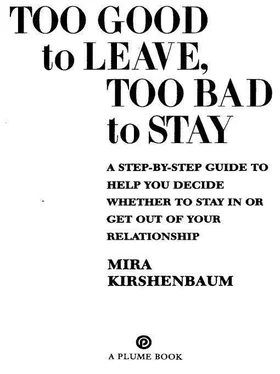Kirshenbaum, Mira - Too Good to Leave, Too Bad to Stay
Здесь есть возможность читать онлайн «Kirshenbaum, Mira - Too Good to Leave, Too Bad to Stay» весь текст электронной книги совершенно бесплатно (целиком полную версию без сокращений). В некоторых случаях можно слушать аудио, скачать через торрент в формате fb2 и присутствует краткое содержание. Жанр: Психология. Описание произведения, (предисловие) а так же отзывы посетителей доступны на портале библиотеки ЛибКат.
- Название:Too Good to Leave, Too Bad to Stay
- Автор:
- Жанр:
- Год:неизвестен
- ISBN:нет данных
- Рейтинг книги:3 / 5. Голосов: 1
-
Избранное:Добавить в избранное
- Отзывы:
-
Ваша оценка:
- 60
- 1
- 2
- 3
- 4
- 5
Too Good to Leave, Too Bad to Stay: краткое содержание, описание и аннотация
Предлагаем к чтению аннотацию, описание, краткое содержание или предисловие (зависит от того, что написал сам автор книги «Too Good to Leave, Too Bad to Stay»). Если вы не нашли необходимую информацию о книге — напишите в комментариях, мы постараемся отыскать её.
Too Good to Leave, Too Bad to Stay — читать онлайн бесплатно полную книгу (весь текст) целиком
Ниже представлен текст книги, разбитый по страницам. Система сохранения места последней прочитанной страницы, позволяет с удобством читать онлайн бесплатно книгу «Too Good to Leave, Too Bad to Stay», без необходимости каждый раз заново искать на чём Вы остановились. Поставьте закладку, и сможете в любой момент перейти на страницу, на которой закончили чтение.
Интервал:
Закладка:
STEP #3: ACTIONS, NOT WORDS
Sometimes the best way to figure out your truth is to look at what you do, not at what you say. Here’s an example.
We’ve all had the experience of spending all day Friday looking forward to going out that night. But when we get home from work we dawdle and laze around and have trouble making up our minds about exactly where we want to go. Soon it’s nine, ten, eleven o’clock, and at some point it hits us that from the moment we got home we were too tired to go out at all. We’d made the decision to stay in the moment we got home, but it took us all evening to realize we were implementing that decision.
It works the same way for a lot of people in relationship ambivalence. Here’s the question to ask yourself:
Diagnostic question #3. Have you already made a concrete commitment to pursue a course of action or lifestyle that definitely excludes your partner?
What do I mean by this? What follows is a clear example.
Ruth’s Story
Ruth had been married for ten years to the same person. Spike was a rock-and-roll musician, and the first several years of their relationship were filled with a sense of promise about his career. There was always the band that was going to take off, the recording contract just around the comer. Ruth worked this whole period as a nurse, and for long stretches her income was their sole support.
Ruth was proud of being a nurse and found satisfaction in helping people, but after a while the work started feeling routine, and she yearned for more meaning, variety, even excitement. Meanwhile, Spike’s aging-rocker routine was getting old. It kept looking less and less likely that the lightning of success would strike his career, and frustration was making him increasingly bitter and blue.
The fairy-tale version of this would be that he let Ruth know she was the one good thing in his life. The real-life version, as you might guess, is that he took a lot of his frustration out on Ruth. If misery loves company, Spike seemed determined to take Ruth down with him.
Ruth was a self-aware woman, and she knew exactly what was going on. But she was kind, generous, and loving. Besides, you know how it is: the more you make an emotional investment like Ruth’s, the harder it is to pull out. She thought about leaving, and even threatened to leave if Spike didn’t change his act. But she never thought she would.
Training to Leave
Here’s what Ruth actually did. As an outlet for her search for a sense that she was really helping people, Ruth volunteered for an organization working with refugees with health problems who were newly arrived in the States. These were refugees from such places as Thailand, Cambodia, Guatemala, Haiti, the former Yugoslavia, Russia, Liberia, and Rwanda. Ruth didn’t speak any of their languages but she had one special qualification besides being a nurse: she was the daughter of refugees herself.
The organization’s main mission was to recruit people like Ruth to go abroad for long periods of time for little or no pay to work in refugee camps in some of the worst places in the world. The training they provided Ruth was geared for sending her to those places.
Ruth acted as though working with these refugees here at home was as far as she wanted to go, but for two years everything she did deepened her ties to this organization that would take her out of Spike’s life.
When I saw Ruth, she was agonizing over whether to stay with Spike or leave him. When I first asked Ruth question #3—Have you already made a concrete commitment to pursue a course of action or lifestyle that definitely excludes your partner? —she said she didn’t think so. But after she told me more of her story I asked her to look again at what she’d actually done and take another crack at question #3.
She sat silently for a long time and then said, “How am I going to tell Spike?” The bullet had left the gun a long time before she was ready to pull the trigger. Deep down she’d already decided to leave him eighteen months earlier.
So here’s the guideline:
GUIDELINE #3
If you’ve actually made a concrete commitment to pursue a course of action or lifestyle that excludes your partner, then on some level you’ve already decided that you’ll be happier if you leave your relationship. Most people who’ve done this are not happy when they stay. It’s as if you’d already advised yourself to leave. Quick take: If you look like you’re leaving your relationship and act like you’re leaving it, you’re leaving it. You know best.
Let’s be precise about what this guideline says and what it doesn’t say. The emphasis is on doing something concrete to change your life in a way that excludes your partner. This does not mean experimenting, fantasizing, speculating, or merely screwing up, and it does not mean doing things that will allow you to keep on having the same kind of life with your partner that you’ve been having. Here are a couple of examples to make this distinction clear:
• Checking out apartments you might move into does not mean you’ve already decided to leave. Actually renting an apartment and paying for the first month plus a security deposit does mean you’ve decided.
• Applying for jobs far away when you know your partner can’t relocate does not mean you’ve already decided to leave. Accepting an offer for such a job does mean you’ve decided (unless you’ve both agreed to a temporary arrangement like this).
• Consulting a divorce lawyer, even a whole series of such consultations, does not mean you’ve already decided to leave. Filing divorce papers after a careful consultation does mean you’ve decided.
Some of these might seem obvious to you. But to stuck stayers, they’re far from obvious.
Actions, Not Accidents
What about affairs? Are they expressions of a “concrete commitment to leave”? Let’s talk about affairs for a moment here. Later we’ll get into the issues behind affairs that make relationships too bad to stay in, but for now I’m only going to look at how affairs relate to guideline #3.
As a result of years of clinical work with couples, I’ve learned not to jump to conclusions about what it means psychologically when someone has an affair. Sure, the person who’s been cheated on (the “cheatee”) often sees the relationship as over when she discovers her partner’s affair. But just because it means it’s over to the cheatee doesn’t mean it’s over to the cheater. Whatever the cheatee feels, it wasn’t necessarily the intention of the cheater to create those feelings.
If you’re in an iffy relationship, the fact that you’ve had an affair could mean many things. It could mean you were experimenting to see if things could be better with someone else. It could mean that you just made a stupid mistake. It could mean you were very angry. In and of itself, it doesn’t necessarily mean that you’re setting in motion a chain of events designed to take you out of your relationship.
Here’s where your having an affair does mean you’ve “made a concrete commitment to leave”: If you stop caring whether your partner finds out or not, then an affair is a sign of your having taken practical steps to set in motion some course of action or lifestyle that definitely excludes your partner. I’m talking about transparent lies. Trips for which you don’t bother to give an excuse. Mysterious late night phone calls or gifts or lipstick stains you don’t try to hide.
If your answer to question #3 is yes, you’ll know it by now. It’s not that you’ve just “done something,” it’s that you’ve done something to burn your bridges behind you or to pour the foundation for a bridge to a new future that excludes your partner. You don’t have to decide to leave. You’ve already decided.
Читать дальшеИнтервал:
Закладка:
Похожие книги на «Too Good to Leave, Too Bad to Stay»
Представляем Вашему вниманию похожие книги на «Too Good to Leave, Too Bad to Stay» списком для выбора. Мы отобрали схожую по названию и смыслу литературу в надежде предоставить читателям больше вариантов отыскать новые, интересные, ещё непрочитанные произведения.
Обсуждение, отзывы о книге «Too Good to Leave, Too Bad to Stay» и просто собственные мнения читателей. Оставьте ваши комментарии, напишите, что Вы думаете о произведении, его смысле или главных героях. Укажите что конкретно понравилось, а что нет, и почему Вы так считаете.












